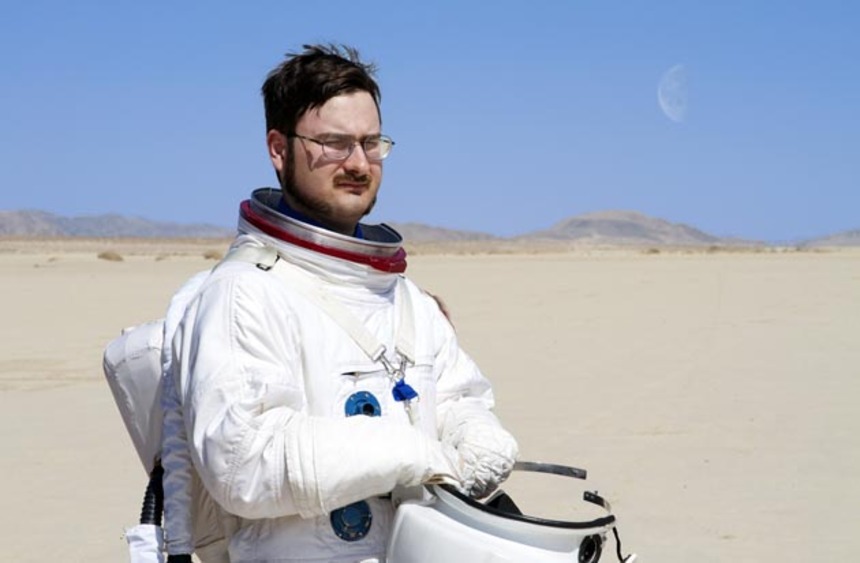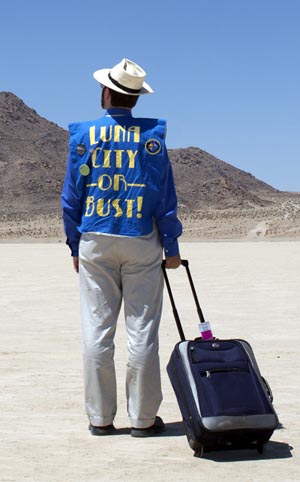SXSW 2013 Interview: ScreenAnarchy Talks to the Mooninites Behind LUNARCY!

Lunarcy! is a charming and humorous story of four eccentrics who've dedicated their entire lives to the Moon. We've got Christopher Carson, the young founder of the Luna Project and a supporter of abandoning Earth forever in favor of a new lunar colony, Dennis Hope, president of the Galactic Government and the official owner of the Moon, Alan Bean, the fourth man to walk on the Moon and the world's leading astronaut painter, and Peter Kokh, space advocate and editor of the Moon Miner's Manifesto.
Ahead of Lunarcy!'s SXSW premiere, we spoke with lead character Christopher Carson, director Simon Ennis and producer Jonas Bell Pasht about the dreaming big and finding the right crater to call home.
ScreenAnarchy: How did this film come together? How did you find Chris and the other moon-obsessed guys in the film?
Simon Ennis (director): We made a narrative feature together in 2009 called YOU MIGHT AS WELL LIVE. We were looking for something else to do, and I was interested in making a documentary, so I was keeping my ear to the ground, looking for any sort of ideas that would work. In the course of a week, I read three totally random articles about the moon, including one on Dennis Hope - the fellow who owns the moon - and I thought his idea was just wonderful and unbelievable and hilarious. And then I read another article that was very heavily science-based about a compound found in moon dust that a lot of scientists think we could mine and use to solve a lot of the Earth's energy needs. The third was about the moon and ancient religion.
 Originally it was going to be a more straightforward documentary about all the ways we've seen the moon throughout history - science, art, religion, culture. But as I started going around interviewing subjects, I became much more interested in the creativity behind what they were doing and their inspiration and passion, so it became less about the moon and more about the people I was talking to. Most of the people in the film, I was either familiar with their work already or I found them through articles.
Originally it was going to be a more straightforward documentary about all the ways we've seen the moon throughout history - science, art, religion, culture. But as I started going around interviewing subjects, I became much more interested in the creativity behind what they were doing and their inspiration and passion, so it became less about the moon and more about the people I was talking to. Most of the people in the film, I was either familiar with their work already or I found them through articles.
The only person I approached without prior knowledge was Chris, who I met at a really dry and boring convention, the Space Access Conference, for people who worked in the commercial space industry, at NASA, a lot of rocket engineers. It was the first shoot in the film and I thought it was going to be a wealth of information and great interviews and I got there and it couldn't have been more boring. It could've been a plumbers' convention. I was getting nowhere and we weren't even fully financed at that point so I thought the whole project was going to collapse. Two days in though, the elevator door opened, and out walked this fellow in a nice mustache and a nice vest set that said "Luna City or Bust." I went over there and asked him about his vest, and he said, "My name is Chris Carson and I'm starting a DIY space program called the Luna Project and I want to go and live on the moon." I told him I was making a documentary about the moon and would love to talk to him, and he said, "Yeah, you better." We found the one good-looking spot in the entire hotel - the karaoke stage at the hotel bar, with the gold background where he's sitting on a stool in the film - and that was it.
Jonas Bell Pasht (Producer): Simon called after that conference being totally despondent, saying this would be the worst thing he's ever been involved in. Then he called me after meeting Chris and said, "We've got it--I found him."
Simon: Although we didn't know that Chris was going to be the star of the film at first. He might've been one interview or one of the space advocates we'd talk to. But as it went on, I kept checking in with him over Skype and finding out what he was up to, and over the course of the year, I went on a number of trips with him and he just happened to take over the movie in an organic way.
ScreenAnarchy: It's totally strange to talk to him - the complete sincerity in everything he says - because this is reality for him and not just a dream. Do you see your interview subjects as more savvy entrepreneurs or kind of delusional dreamers?
Simon: That's a tough question because I don't think dreaming big is a delusion. I think it's a wonderful and admirable thing to go for - and that's what I hope people get out of the movie, that it inspires people to dream as big as possible. It may sound far fetched, but if we don't explore those ideas, we'll never know what's possible.
ScreenAnarchy: Chris, Why do you think the moon is the perfect home for you? How are you so confident that that's where you belong?
Christopher Carson: I don't know that I'd say it's ... perfect. You understand, it's a place to go. It is the first stepping stone on the outward path into the cosmos for humanity, and as I am, on my good days, a human being, therefore for me. It's not ideal, but as Peter says in the film, it's got three things going for it: location, location, location. In other words, it's someplace I can get to, and it's also a place with materials where I can produce food, industrial goods, shelter, and all those necessary things of life. What I really want to do is get out into space permanently, and the moon is the first place where that's possible.
ScreenAnarchy: You chose a specific crater for your new home - how did you choose it?
 Christopher: I looked at a lot of options and went through a decision tree process. I decided it needed to be on the near side - so you can have constant radio contact with Earth, and also for the psychological value of being able to see the Earth, and the Earth to see you, because of the out-of-sight, out-of-mind problem. But then I said you've got to have a variety of geological resources - you need diverse minerals, and large areas of the moon are just one type of mineral. [Takes out an elaborate illustration of the moon, in which each color is a different stratigraphic unit, to explain further.] So the Plato Crater is one of the most diverse areas of its size, from a mineralogical point of view, on the whole lunar surface. [Rambles for another five minutes about flooded wall planes, permanent shadow, the waste heat issue, etc. - all details included in thick informational packet he created.]
Christopher: I looked at a lot of options and went through a decision tree process. I decided it needed to be on the near side - so you can have constant radio contact with Earth, and also for the psychological value of being able to see the Earth, and the Earth to see you, because of the out-of-sight, out-of-mind problem. But then I said you've got to have a variety of geological resources - you need diverse minerals, and large areas of the moon are just one type of mineral. [Takes out an elaborate illustration of the moon, in which each color is a different stratigraphic unit, to explain further.] So the Plato Crater is one of the most diverse areas of its size, from a mineralogical point of view, on the whole lunar surface. [Rambles for another five minutes about flooded wall planes, permanent shadow, the waste heat issue, etc. - all details included in thick informational packet he created.]
ScreenAnarchy: You seem to know - or think you know - exactly what you'll find when you get to the moon. Do you think there's a chance you might be disappointed with what you see when you get there?
Christopher: I wouldn't say disappointed. If anything, I would expect pleasant surprises. The fact is, we're not in any position, of, say, the Massachusetts Bay colony - we know pretty well what we're getting into. We have maps, and they get better every day. We have a good idea of the chemical composition of the surface, which is obtained by taking multi-color photographs from orbit and other instruments like radiation particle counters and by comparing those with the samples that were brought back from the Apollo period. We have a lot of work that's already been done on how to produce food, oxygen, metals, glass there -
ScreenAnarchy: Sure, but psychologically, is there a chance that the Moon might not feel more like home to you?
Christopher: Psychologically, I would say, it's a very challenging environment. You've got that black sky, and the very close horizon. It's hard to see everything - it looks like you're falling off the world almost - so it is a very challenging environment. And you've got your interior spaces, which will be quite cramped and uncomfortable for some time, to be honest. For people who say, 'the world is what you make it,' there's no better case for that than space colonization. Ultimately, you're going into an environment, where you literally have the chance to create the environment that best suits you. So, to an extent, I would say that disappointment is internal. If you fail in your intentions, you'll always be disappointed, no matter if you fail on Earth, on the Moon, on the bottom of the ocean, on Venus. If you don't accomplish the things that you set out to do, of course you'll be disappointed. But if I get to the moon, that's such a big chunk of what I set out to do, that everything beyond that is easy-peasy. Everything beyond that is just pie.
ScreenAnarchy: The goal you set out at the end of the film was summer 2012. What's the updated goal?
Christopher: Well, that was a date that I set out with in 2007. Obviously it is not one that I hit. But things are looking up constantly. Things are looking pretty good. I can't give you an exact date when - that depends on factors that are out of my control - but things are looking very favorable. It's not going to be less than 24 months because that's how long it would take to put the expedition together. Anything more than 24 months is unnecessary delay, in my opinion.
Lunarcy! will premiere on EPIX on April 3rd.







